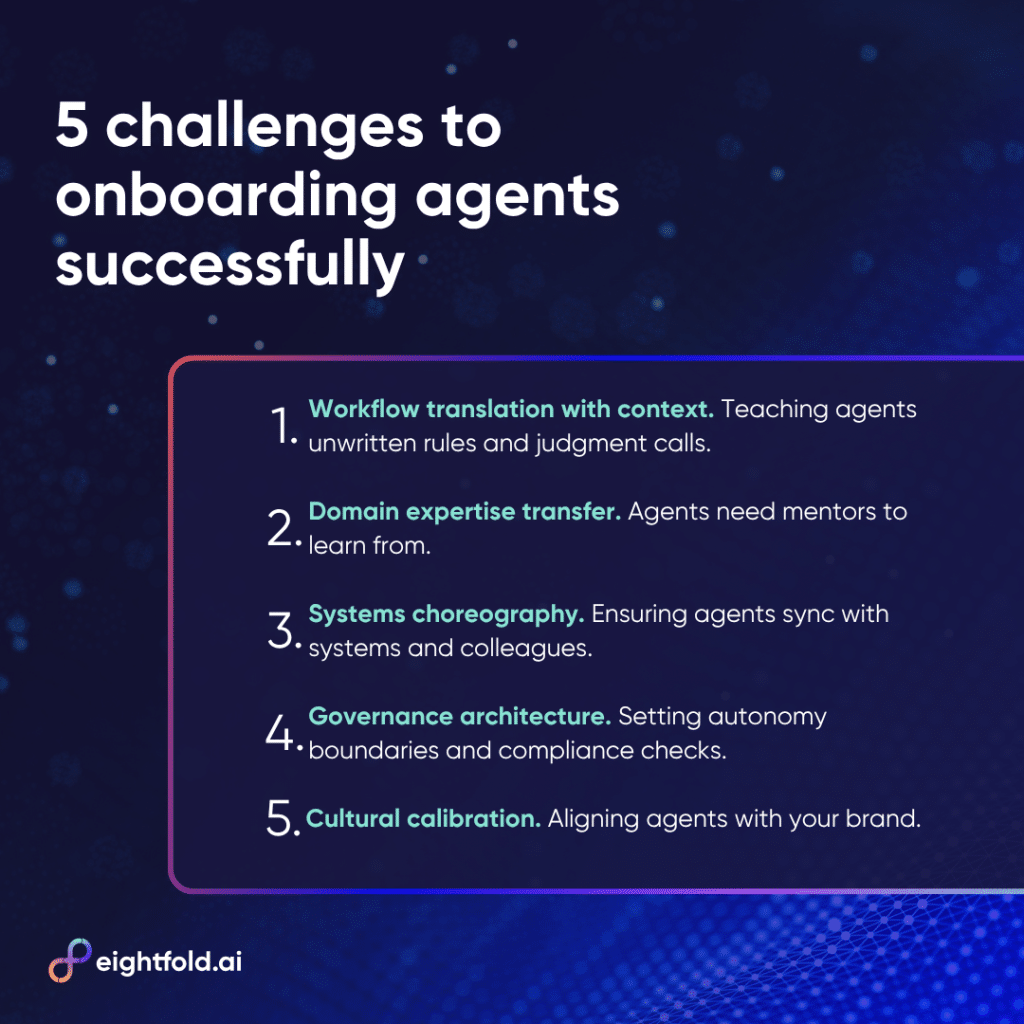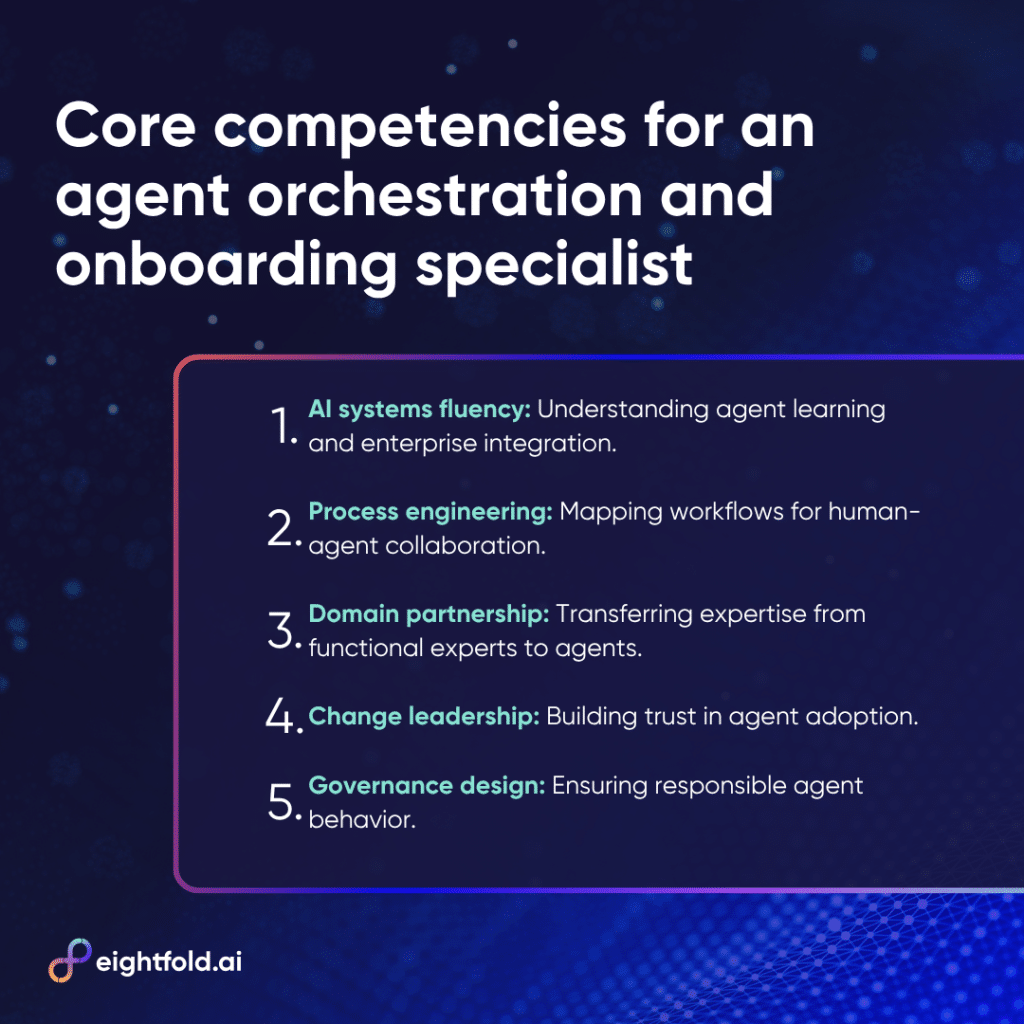Your new marketing analyst starts on Monday. She’s pre-trained on campaign optimization, knows your industry inside out, and can analyze customer sentiment across 47 languages while coordinating real-time lead handoffs.
The catch? She’s an AI agent, and without proper onboarding, she’ll turn your brand voice into a soulless algorithm.
This isn’t sci-fi. It’s next quarter’s reality.
Here’s why the agent orchestration and onboarding specialist will be the most critical hire of 2026.

The integration gap
The data is stark. Microsoft’s 2025 Work Trend Index shows 82% of executives expect AI agents in their workforce within 18 months, but only 23% feel confident about effective integration. This also calls into question whether enterprises may spend big on agent services in the next few years only to find their investment risks being wasted due to poor AI agent integration.
The agent-as-a-service shift
The era of exclusively building custom AI agents from scratch is evolving. Enterprises are now both buying pre-trained agents from vendors and building their own custom agents using vendor platforms and frameworks.
For example, our AI Interviewer agent conducts autonomous 24/7 candidate interviews, achieving up to 90% faster interviews.
Why agent onboarding is unique
Onboarding people means teaching culture and expectations. Onboarding AI agents means rewiring workflows for seamless human-agent collaboration.
It’s a five-layer challenge:
- Workflow translation with context. Teaching agents unwritten rules and judgment calls, like when a sales agent should escalate a deal based on customer cues.
- Domain expertise transfer. Agents need mentors. A recruiting agent must learn from top recruiters how to read résumés, probe in interviews, and sell your organization.
- Systems choreography. Ensuring agents sync with systems and colleagues. A customer service agent causing bottlenecks could be remedied with an orchestrator streamlined handoffs, cutting down processing time.
- Governance architecture. Setting autonomy boundaries and compliance checks. What can agents decide alone? How do you audit for bias?
- Cultural calibration. Aligning agents with your brand. Instead of stiff responses, an agent can be trained to use region-specific, empathetic phrasing which could reduce escalations.
Orchestrators don’t just configure agents. They architect integrated human-AI teams.
Why not automate orchestration?
Some assume orchestration can be automated or handled by IT.
Current tools can’t replicate the nuanced judgment enterprise integration requires, and IT teams often lack change management or domain expertise to lead adoption.
Dedicated orchestrators bridge this gap, ensuring agents amplify human work.
The orchestration imperative: Speed wins
Accenture’s data shows organizations with orchestration specialists achieve full agent productivity 65% faster and have 3x higher employee satisfaction. Without orchestration, agents are costly tools. With it, these are colleagues that can amplify our capabilities.
This is about competitive advantage. JPMorgan Chase’s orchestrated agents process loans 40% faster, while a regional retailer boosted online sales by $1.2 million annually after proper integration. Speedy orchestration captures market share.

Skills and career paths for the role
Core competencies:
- AI systems fluency: Understanding agent learning and enterprise integration.
- Process engineering: Mapping workflows for human-agent collaboration.
- Domain partnership: Transferring expertise from functional experts to agents.
- Change leadership: Building trust in agent adoption.
- Governance design: Ensuring responsible agent behavior.
Career paths:
- Specialization: Deep expertise in marketing, finance, or engineering agents.
- Leadership: Managing orchestration teams.
- Consulting: Helping multiple organizations integrate agents.
Orchestrators often come from business analysis, process improvement, or technical project management.
Deloitte’s analysis shows organizations with mature orchestration by mid-2026 will capture 2-3x more value from agents due to network effects. Laggards will struggle to catch up.
Leadership action plan
Start building your AI orchestration specialist capability now:
Phase 1: Assessment
- Audit workflows for agent potential.
- Identify experts to mentor agent onboarding.
- Evaluate change management capabilities.
Phase 2: Pilot program
- Select a high-impact use case (e.g., customer support).
- Form a cross-functional team (IT, operations, domain experts).
- Partner with vendors.
- Enroll in training.
Phase 3: Scale preparation (next six months)
- Hire an AI orchestration and onboarding specialist.
- Build governance and integration protocols.
- Plan for multi-unit scaling.
Phase 4: Competitive advantage
- Deploy orchestrated agent teams across functions.
- Measure integration speed vs. competitors.
- Refine orchestration based on performance data.
The bottom line
2026 won’t be the year AI agents arrive. It will be the year some organizations make them productive, while others learn the cost of delay.
The AI orchestration specialist is the key to unlocking the agent economy, separating leaders from laggards.
Learn how agents can help you recruit more effectively and efficiently by booking a demo.
